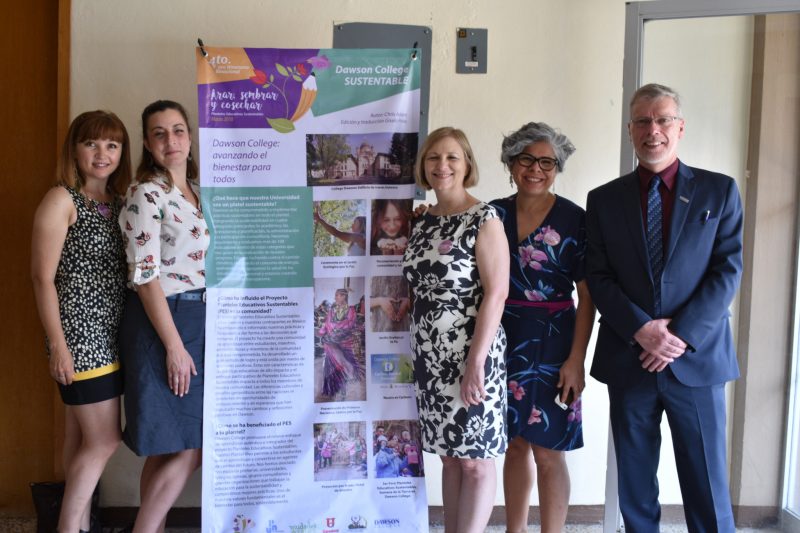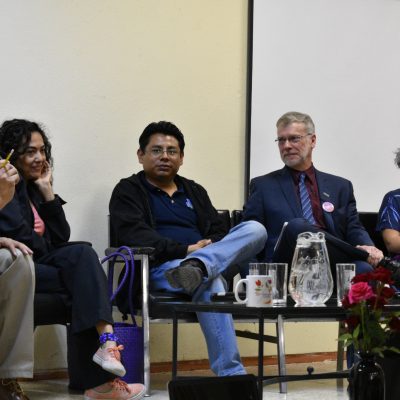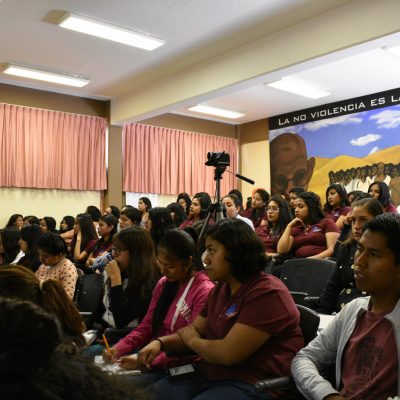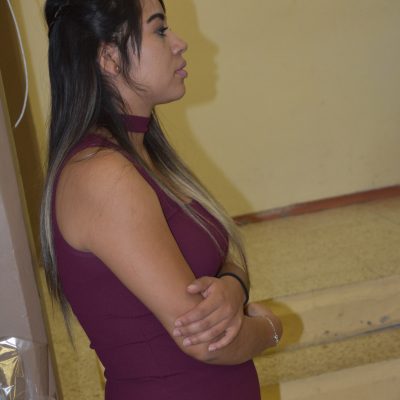English follows
Luisa Montes, Tres Marías/Ciudades Verdes
La segunda jornada tuvo lugar en la Universidad Pedagógica Nacional campus Cuernavaca. El auditorio parecía esperar con entusiasmo a la caravana PES porque estaba vestido con flores y ataviado con equipo de sonido y de proyección, además, la presencia de Yessica Rayo, afable y amable, quien sería la maestra de ceremonias, eran augurio de que interesantes cosas pasarían allí.
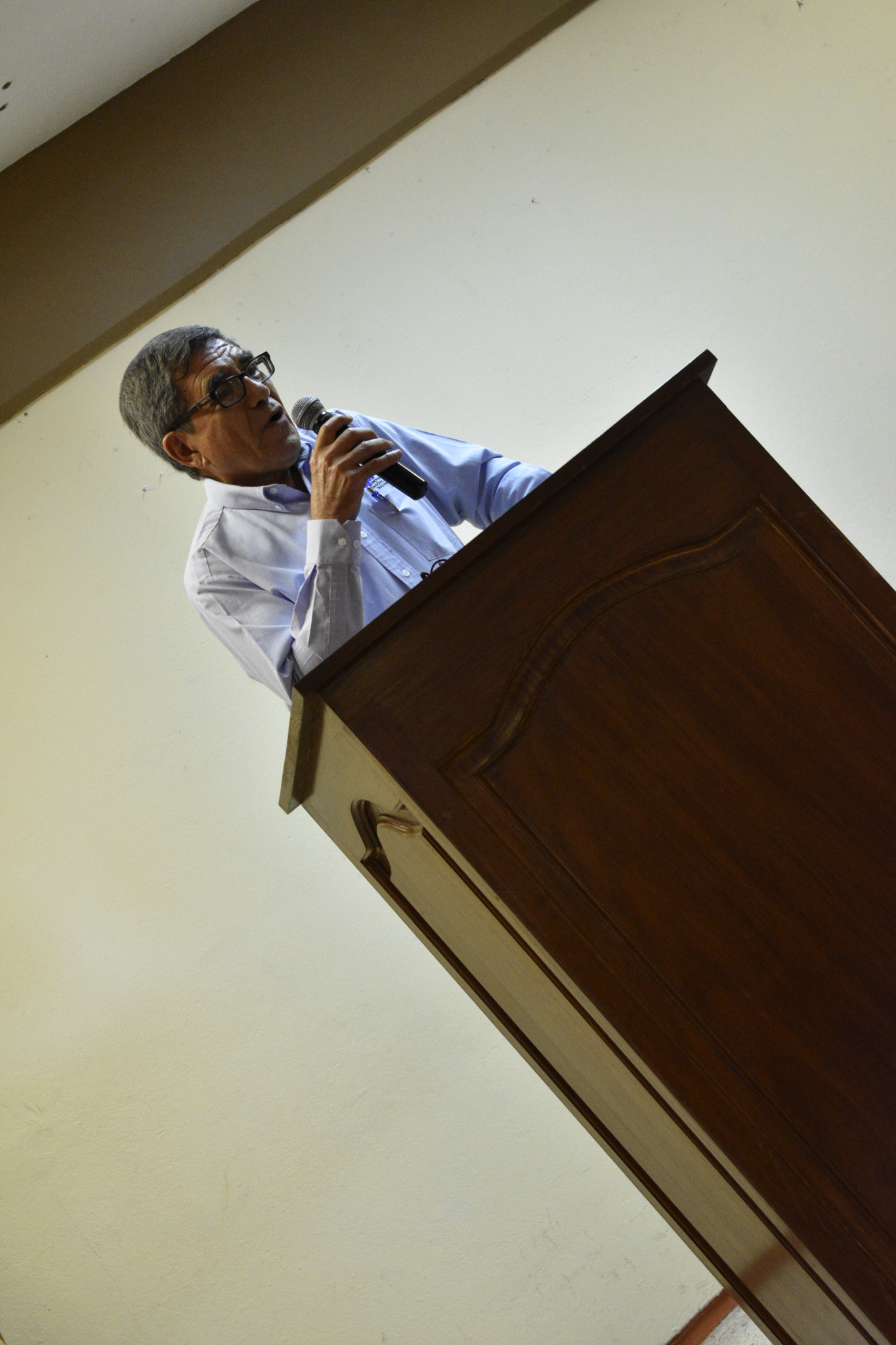
La predicción comenzó a cumplirse cuando el Maestro Aroldo Aguirre Wences, Director general de UPN Morelos subió al estrado para darnos la bienvenida; el profesor Aguirre comenzó por hacernos una confesión, (así las cosas amigos) el Director de la UPN Morelos nos contó que leyó mal el nombre del Foro… la palabra arar la confundió con la palabra amar; finalmente comprendió que tal “error” fue afortunado porque el acto de la siembra y la cosecha no serían posibles sin amor y agradecimiento a la tierra, y así de inspirado, recitó “Otoño” del poeta Juan Ramón Jiménez y así se estableció una atmósfera más que apta para iniciar las acciones.
Sembrar, fue el tema central este segundo día del foro, y qué mejores semillas que las investigaciones forjadas a lo largo de este proyecto. La investigación/Acción es una constante en este camino a la sustentabilidad, por ello, fuimos testigos de un conversatorio entre la Doctora Gisela Frías, Coordinadora general del proyecto, el Maestro Chris Adam de Dawson College, el Doctor Juan Nambo de Upemor, la Maestra Luisa Montes de la Preparatoria Comunitaria de Tres Marías y el Maestro Jorge Domínguez de UPN Morelos. Ellos forman un equipo de investigación sobre diversas temáticas relacionadas con la sustentabilidad en los planteles. La conversación giró en torno a seis cuestionamientos que detonaron un intercambio entre los panelistas:
¿de qué manera construyeron su objeto de estudio?, ¿cómo y por qué decidieron las problemáticas que investigan?, ¿de qué manera sus investigaciones se vinculan con la sustentabilidad?, ¿cómo apoya su investigación la creación o fortalecimiento de planteles educativos sustentables?, Cuál es el abordaje teórico/metodológico que utilizan en sus investigaciones?, ¿Qué dilemas y oportunidades han encontrado en el proceso?.
Los asistentes, con su silencio atento, fueron parte empática en esta charla, algunas opiniones vertidas consideraron el panel interesante, entretenido y esperanzador. Si estas son las semillas, ¿cuáles serán los frutos?, albricias… que sean geniales.
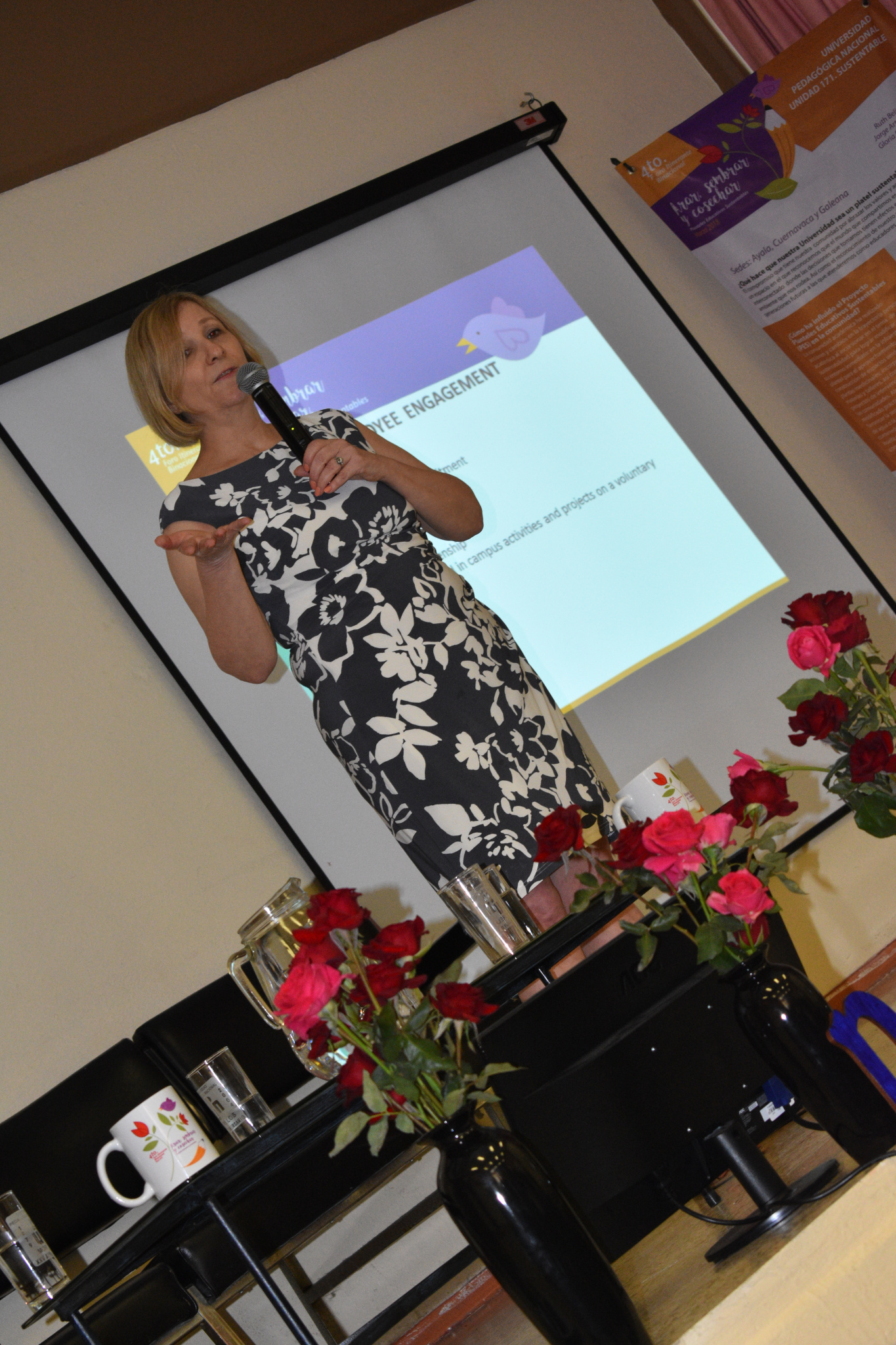
Posteriormente escuchamos a Katherine McWahw, Coordinadora de Control de calidad y planificación en Dawson College. La ponente, nos puso a pensar, a comprometernos, a observar avances y a valorar escenarios de oportunidad. Es muy importante trabajar, apasionarse, actuar, sí, por supuesto, pero hay que poner atención a las evidencias, sistematizar todo para que ello sea la base de lo que sigue, la inspiración para no rendirnos, la prueba que convenza, que sume fuerza. – La cosa es como bailar salsa -, nos dijo; y todos quedamos sorprendidos, – lo voy a demostrar -, agregó, y lo hizo. – No basta hacer las cosas por hacerlas, hay que apasionarse en ello, disfrutarlo y compartirlo, para que se contagie y se antoje. Hay que trabajar juntos, confiar en los pasos propios y los de los demás que suman sus talentos, hay que fluir en armonía, como cuando bailas salsa, y eso requiere de trabajo y disciplina porque si no los hay, se nota que no sabemos bailar. Y nos llevó al baile como decimos en México, nos puso a pensar en que es preciso no omitir ni deslindarnos, ni atender a la ligera esa parte en nuestras acciones, sean cuales sean porque la evidencia es palabra de honor. Gracias por esta enseñanza Katherine McWahw.
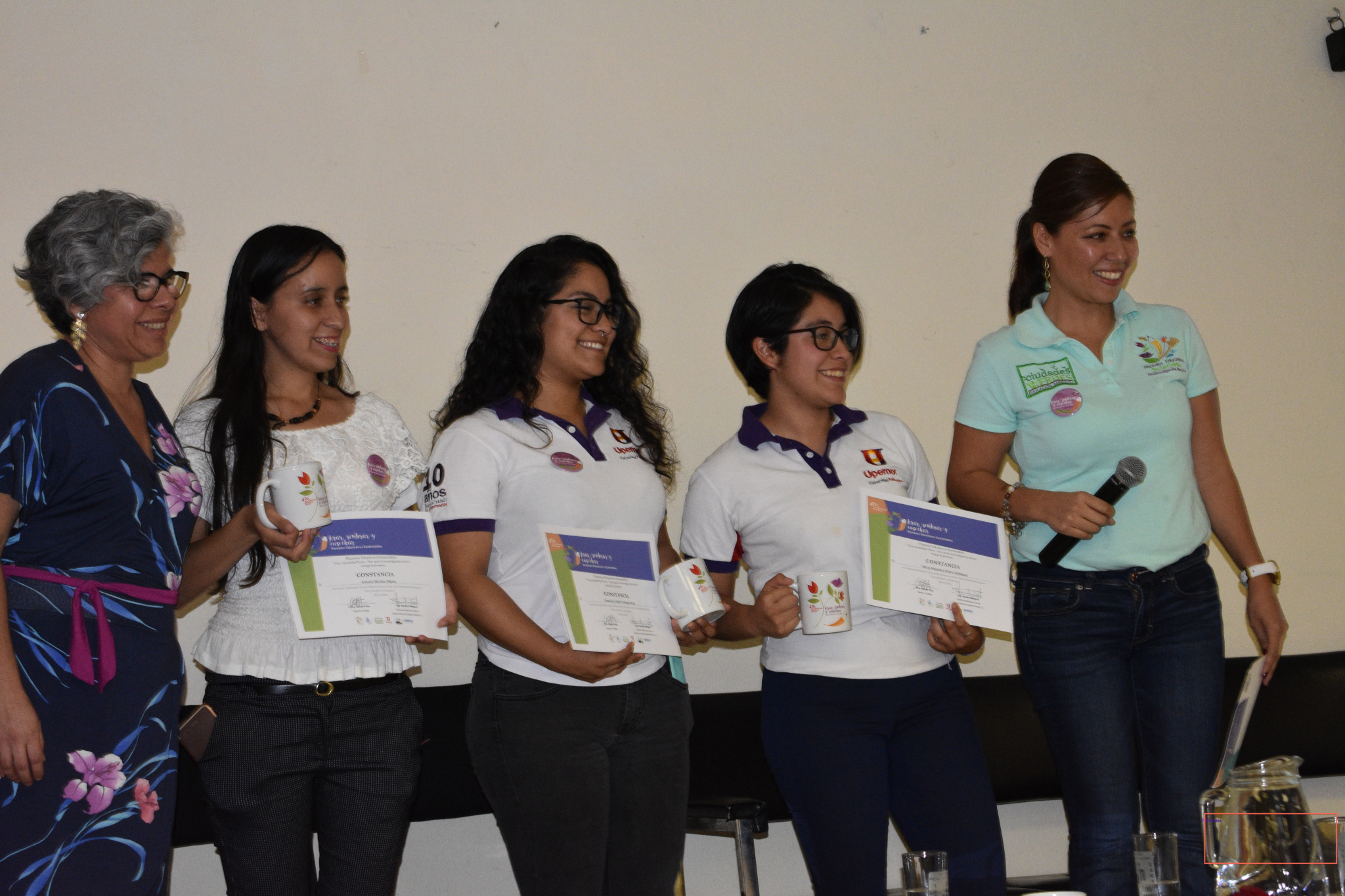
Entonces aparece la juventud en escena, escucharla es color esperanza como dice una canción. La investigación realizada por estudiantes de Upemor y UPN que han asumido Retos Sustentables, fue evidenciada en tres estupendas presentaciones. Antonia Sánchez representante del plantel educativo anfitrión, dio a conocer el proceso de intervención educativa realizado en una escuela secundaria rural; su propuesta fue demostrar cómo a partir de la creación de un Huerto escolar, aumenta la motivación de los estudiantes por asignaturas en las que muestran menor desempeño. Una intervención educativa que aporta enseñanza, aprendizaje, diversión, motivación e interés.
Mitzy Chávez de Upemor realizó un estudio comparativo entre su Universidad y Dawson College que documenta las emisiones contaminantes, el reto es reducirlas al máximo y esta investigación aporta información valiosa para ambos campus al ofrecer alternativas de acciones en ese sentido. Por su parte, Casandra Venegas, también estudiante de Upemor, mostró un estudio realizado en el plantel de UPN campus Cuernavaca que tiene la finalidad de analizar, diseñar, instalar y operar un sistema de captación de agua pluvial que sea capaz de disminuir los problemas de agua que presenta este plantel. La colaboración interinstitucional a partir de la investigación acción es línea común de los trabajos presentados, y eso nos permite mirar al futuro con ojos nuevos.
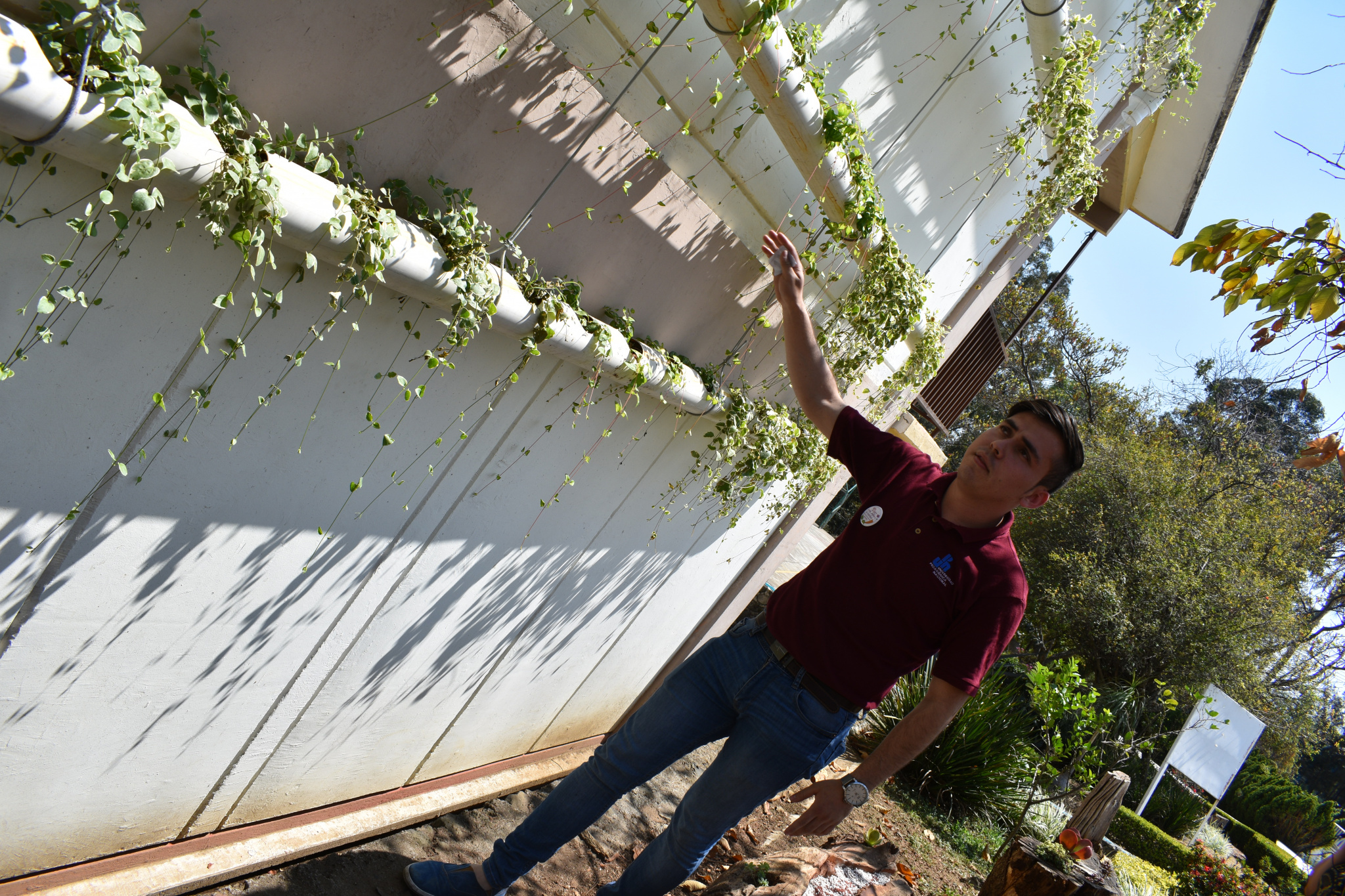
Tiempo de aplicar la itinerancia que caracteriza los Foros del proyecto PES. Fuimos a conocer los proyectos locales, el estanque de la amistad fue la primera parada, un lugar donde un filtro casero, algunas plantas acuáticas y 13 peces amigos comparten un espacio ofertado a la amistad mientras demuestran la manera de mantener un hábitat que filtre agua para su reutilización, acción que pretende menguar la problemática del abasto de este líquido en el plantel. Enseguida nos encaminamos a conocer el muro verde, una instalación que a las puertas del plantel da la bienvenida a sus visitantes. Este muro ha sido resultado de lo aprendido en diversos Sustentours y con la colaboración de la Preparatoria Comunitaria de Tres Marías, pretende ser un espacio verde que se alimente de agua pluvial colectada mediante un sistema captador de agua en proceso con el apoyo de la Upemor. La última parada es la lombricomposta, un proyectos pioneros en esta sede donde se procesa material orgánico procedente de la cafetería de la comunidad educativa que la alberga.
Resulta tan grato reconocernos comunidad PES, caravana PES y además tener la oportunidad de apadrinar un PEZ del estanque de la amistad. Grandes ideas sin lugar a dudas. Esto Inspira.
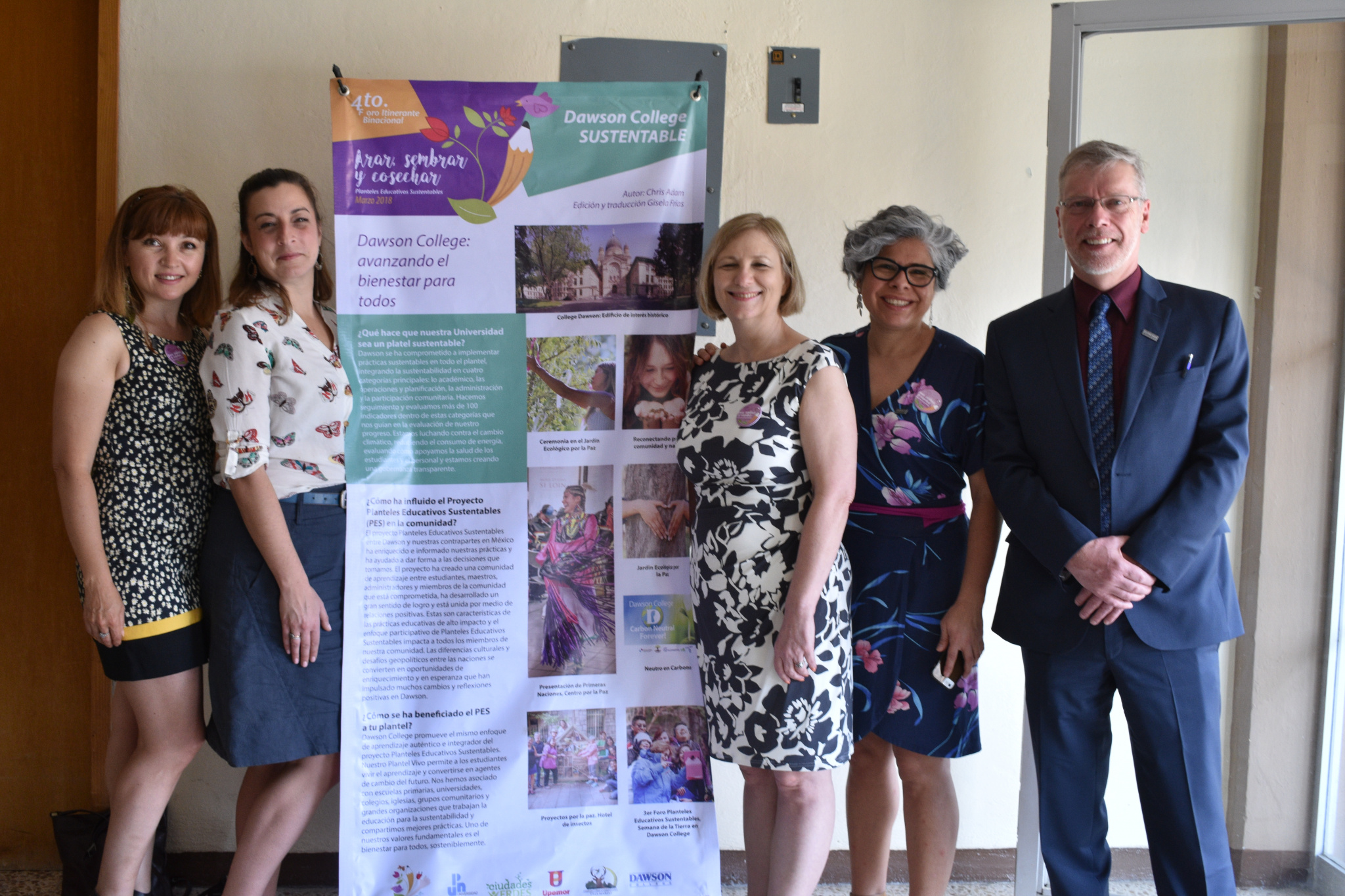
Fourth Binational Traveling Forum: Plow, sow and harvest sustainable educational facilities.
Luisa Montes, Tres Marías/Ciudades Verdes
The second day took place at the Universidad Pedagógica Nacional in the Cuernavaca campus. The auditory seemed to wait enthusiastically for the PES caravan because it was dressed in flowers and geared with sound and projection equipment. The presence of Yessica Rayo, affable and kind, who would be the master of ceremonies, was an omen that interesting things would happen there.

The prediction began to be fulfilled when Professor Aroldo Aguirre Wences, General Director of UPN Morelos, took the stage to welcome us; Professor Aguirre began by making us a confession, he told us that he misread the name of the Forum… He confused the word Plow with the word love; He finally understood that such an “error” was fortunate because the act of sowing and harvesting would not be possible without love and gratitude to the earth, and thus inspired, recited “Autumn” by the poet Juan Ramón Jiménez. Thus, established an atmosphere more apt to initiate the actions.
Sowing, was the central theme this second day of the forum, and what better seeds than the research forged throughout this project. Research / Action is constant in this path to sustainability; therefore, we witnessed a conversation between Dr. Gisela Frías, General Coordinator of the project, Professor Chris Adam of Dawson College, Dr. Juan Nambo of Upemor, Professor Luisa Montes of the Community High School of Tres Marías and Professor Jorge Domínguez of UPN Morelos. They form a research team on various topics related to sustainability in the campuses. The conversation revolved around six questions that triggered an exchange between the panelists:
In what way did they build their object of study? How and why did they decide the problems they are investigating? How is their research linked to sustainability? How does their research support the creation or strengthening of sustainable educational facilities? What is the theoretical / methodological approach used in their research? What dilemmas and opportunities have they encountered in the process?

Later we listened to Katherine McWahw, Coordinator of Quality Control and Planning at Dawson College. The speaker, made us reflect on committing, observing progress and valuing opportunity scenarios. It is very important to work, to be passionate, to act, yes, of course, but we must pay attention to the evidence, systematize everything so that it is the basis of what follows, the inspiration to not give up, the proof that convinces, that adds strength . “It is like dancing salsa” – she told us; we were all surprised. “I’m going to show it” – she added, and she did. “It is not enough to do things for the sake of doing them, you have to be passionate about them, enjoy them and share them, so that it gets contagious and craved. You have to work together, trust in your own steps and those of others who add their talents, you have to flow in harmony, like when you dance salsa, and that requires work and discipline because if there is not, one can tell that you do not know how to dance. It made us think that it is necessary not to omit or demarcate ourselves, nor to take lightly that part in our actions, whatever they may be because the evidence is a word of honor. Thanks for this lesson Katherine McWahw.

Then the youth appears on stage, listening to it is of the color of hope, as a song says. The research carried out by Upemor and UPN students who have assumed Sustainable Challenges was evidenced in three great presentations. Antonia Sánchez, representative of the host educational institution, announced the educational intervention process carried out in a rural high school; her proposal was to demonstrate how, starting with the creation of a school garden, students’ motivation for subjects in which they show lower performance increases. An educational intervention that provides teaching, learning, fun, motivation and interest.
Mitzy Chávez de Upemor conducted a comparative study between her University and Dawson College that documents polluting emissions, the challenge is to reduce them to the maximum and this research provides valuable information for both campuses by offering alternative actions in that sense. On the other hand, Casandra Venegas, also a student from Upemor, showed a study carried out on the campus of UPN campus Cuernavaca that has the purpose of analyzing, designing, installing and operating a rainwater collection system that is capable of reducing the problems of water that presents this establishment. Interinstitutional collaboration based on action research is a common line of the works presented, and that allows us to look to the future with new eyes.

Time to apply the roaming that characterizes the Forums of the PES project; We went to visit the local projects, the friendship pond was the first stop, a place where a homemade filter, some aquatic plants and 13 friendly fishes share a space offered to friendship while demonstrating the way to maintain a habitat that filters water for reuse, action that seeks to reduce the problem of the supply of this liquid in the campus. Immediately, we went to see the green wall, an installation that welcomes visitors to the campus doors. This wall has been the result of what has been learned in various Sustentours and with the collaboration of the Community High School of Tres Marías, it aims to be a green space that feeds on rainwater collected through a water collection system in process with the support of the Upemor. The last stop is the vermicompost, a pioneering project in this headquarters where organic material is processed from the cafeteria of the educational community that houses it.
It is so nice to recognize ourselves in the PES community, PES caravan and also have the opportunity to sponsor a PEZ of the friendship pond. These are great ideas without a doubt. This Inspires.

